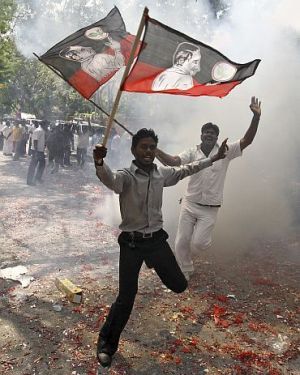 T C A Srinivasa-Raghavan tells why books on politics by journalists are so fascinating and sell so well
T C A Srinivasa-Raghavan tells why books on politics by journalists are so fascinating and sell so well
The first books on politics that I read were Kuldip Nayar's Between the Lines, which was a thrilling narrative of Congress politics between 1966 and 1969 and Durga Das' India from Curzon to Nehru published in the mid- or late 1960s.
After that, there was a gap for nearly a decade before another set of political books came along. The Emergency ended in 1977 and between 1977 and 1980, when Indira Gandhi was voted back to power, many books about the Emergency and the politics of the 1970s were written.
The one I liked the most was Janardan Thakur's All the Prime Minister's Men published in 1977. Ajoy Bose and John Dayal also wrote a very good book called For Reasons of State: Delhi Under Emergency.
From then till 2013 we didn't get any real best-sellers. There was the odd one about Bofors or the Ayodhya demolition but nothing very notable.
The exception was P V Narasimha Rao's classic, The Insider. It is one of the most underrated books on politics ever.
It was thinly disguised as a novel but it laid bare Congress culture and politics of the 1950s and 1960s. I doubt if anything much has changed since then.
Now 2014 has seen two runaway successes -- Sanjaya Baru's The Accidental Prime Minister and Rajdeep Sardesai's 2014: The Election that Changed India. Tavleen Singh's Durbar wasn't bad either, even if it was sometimes a little spiteful.
I am sure there are other books in this genre that I have not read. But these are the ones I liked best.
The guy whose book I am waiting for, though, is M J Akbar. Hopefully, he will lock away his scholar persona, which is not very convincing, and write a deliciously malicious tell-all book, not the least of which is why he, of all people, joined the Bharatiya Janata Party!
All these books have one thing in common: they have been written by journalists with an instinctive grasp of the 3 ingredients that make politics so utterly fascinating: ambition, intrigue and deceit.
Politics, in the end, is not about grand visions, as historians would have us believe. It is about the ruthless and usually immoral quest for power. It is about total surrender to the boss and total domination of equals and subordinates.
One must also have a flair for thinking in cynical ellipses and must be able to pinpoint the truly petty motives that guide politicians most of the time. Without these basic tools, it is probably impossible to be a very good reporter of politics.
To be a good political writer, therefore, one needs to have a feel for low cunning. It is what sets the men apart from the boys.
But an understanding of low cunning is not, by itself, enough for political writers. It must be complemented by the ability to link into a coherent whole the seemingly disparate dots that emerge during conversations with politicians and the bureaucrats who work with them.
I have always been amazed at how frank politicians are and how indiscreet bureaucrats can be. They can let things slip from which, if you are clever, you can explain many seemingly inexplicable things.
These slips occur because often, journalists are routinely used to float ideas for testing the waters, to abort initiatives that a politician or bureaucrat doesn't personally like, to malign rivals and, in the ministry of external affairs, convey messages to the embassies.
Sometimes, but only rarely, they are used as go-betweens between politicians. Many editors and reporters of "impeccable integrity" have been willing tools.
But injecting yourself into the narrative is not a very good idea. Such fake-modest simpering can be done via footnotes.
Just as good journalists know what the main weaknesses of politicians are, the politicians also know what the chief weakness of such journalists is: their vanity.
Nothing pleases a top-flight journalist more than to be able to say "the PM told me ... "or " ... said to me ... " or "the FM has called me". The other device is to make them members of official committees or to pretend to consult them.
Many books on politics by journalists fall into this trap. The reader has no way of verifying anything, and the politician, even if he has been misquoted, doesn't care enough to rebut it strongly, if at all. It's win-win for all.
In the end, though, the real value of such books lies in the amount of gossip that they retail.
To look in them for deep insights is futile.

.jpg)










 © 2025
© 2025